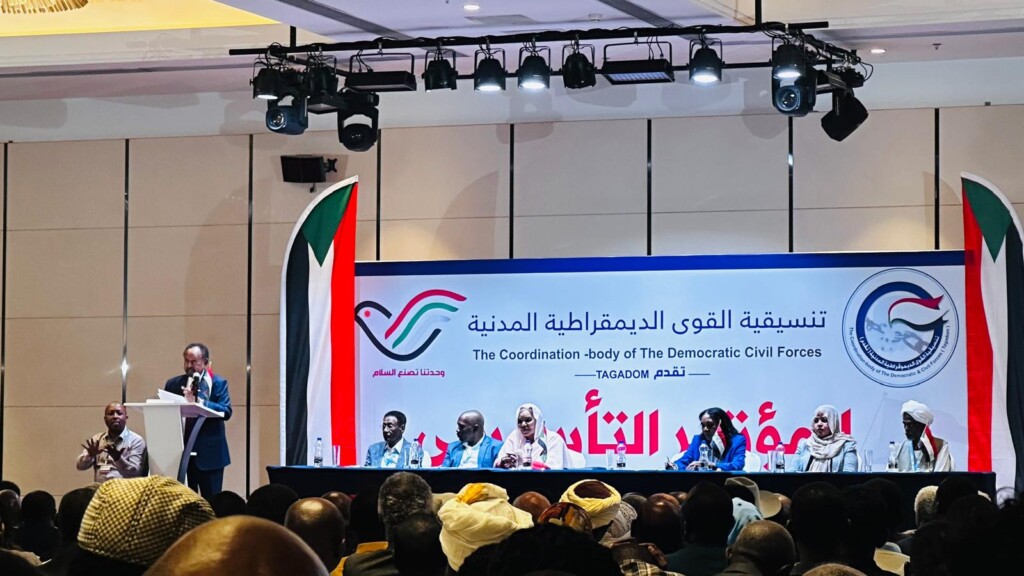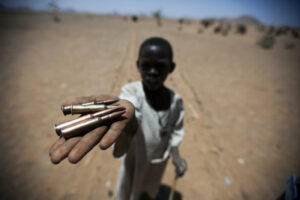Tagadom conference prompts mixed responses in Sudan

Former Sudan PM addresses the closing session of the conference of the Civil Democratic Forces (Tagadom) in Addis Ababa (Photo: Radio Dabanga)
The Communist Party of Sudan has apologised for attending the founding conference of the Civil Democratic Forces alliance (Tagadom), that took place in the Ethiopian capital Addis Ababa from 27-30 May. Sudan’s Human Rights Commission advised civil society bodies “to keep out of politics”, and the Darfur Bar Association confirmed that it was not invited to attend, and reserves comment pending “sufficient information”.
Tagadom (meaning progress in Arabic) is a coalition of political parties, political forces, and civil society organisations concerned with stopping the war, was established in October last year. The founding conference was attended by 600 delegates from the mainstream Forces for Freedom and Change (FFC-Central Council)* and other Sudanese pro-democracy parties and groups. It concluded – amid some heated debate – with agreement on a political paper, and confirmed the election of former Sudan Prime Miniter Abdullah Hamdok as its president. However the outcomes have not been embraced by all sectors of the political spectrum.
The Communist Party of Sudan (CPoS), which withdrew from the FFC at the end of 2020, and announced in January that it would not attend the talks, bases its apology for participating in the Addis conference on what it terms “the wide discrepancy between the party’s vision and the theses of Tagadom, and its consequences on the future and fate of Sudan”.
The party secretariat explained that the discrepancy resulted from a deep disagreement over the assessment of the course of events since the outbreak of the revolution in December 2018, parties’ divergence from the aims of the revolution during the transitional period, and “the results that returned the country to the general crisis that manifested itself in political instability and dependence on foreign aid”.
Human Rights Commission
In a statement, the Sudanese Human Rights Commission advised non-political civil bodies “to refrain from practicing political work and to abide by their role within the scope of their mandate”. The commission called on civil society organisations and human rights and professional entities “not to abandon their responsibilities and tasks in monitoring political practice to ensure that political forces are respected when practicing their political operations in a proper manner”.
The commission asserts that “the proper participation of civil, religious, and civil society and all types of non-partisan groups and sectors of society in political events, should be limited to the scope of identifying the integrity of the practice and strengthening control over it” and warns against “any attempts to repeat the mistakes that resulted after the success of the December revolution in isolating the first line of the staff of the coup authority of the regime of ousted President Omar Al Bashir.
Darfur Bar Association
In a separate statement seen by Radio Dabanga, the Darfur Bar Association (DBA) confirms that while it did not receive an invitation to attend and participate in the Tagadom conference, it “supports any sincere and sincere efforts being made to stop the war”.
The DBA notes that while it has received inquiries from several bodies monitoring Sudanese affairs regarding its evaluation of the Tagadom conference, and the future of its results, “the DBA informed those bodies that as it was not invited to the conference, did not participate in any way, it does not yet have sufficient information to comment at this time.
* The FFC has been prone to divisions since its formation in early January 2019. The National Umma Party (NUP), the Democratic Unionist Party (DUP), and the Socialist Arabic Ba’ath Party, which already witnessed internal schisms during the Al Bashir regime, fragmented further due to opposing views and standpoints on talks with the military. The Communist Party of Sudan withdrew from the FFC at the end of 2020. The mainstream Ba’ath Party left the coalition two years later. The FFC-CC now consists of several (splinter) political parties and new groups such as the SPLM–Democratic Revolutionary Movement (DRM).
The Forces for Freedom and Change-Democratic Bloc (FFC-DB) was formed in November 2022. It brought together two Darfur rebel movements that backed the SAF-RSF coup d’état in October 2021 (the Justice and Equality Movement (JEM) led by Jibril Ibrahim, and the Sudan Liberation Movement (SLM-MM) breakaway faction headed by Minni Minawi, along with the Democratic Justice Alliance chaired by former rebel leader Mubarak Ardol, and the mainstream Democratic Unionist Party. The alliance also includes the Republican Party, the Beja Nazirs Council wing chaired by Sayed Tirik, the National Movement Forces coalition of former Darfur leader El Tijani Sese, and a number of split-off groups from mainstream political parties.











 and then
and then